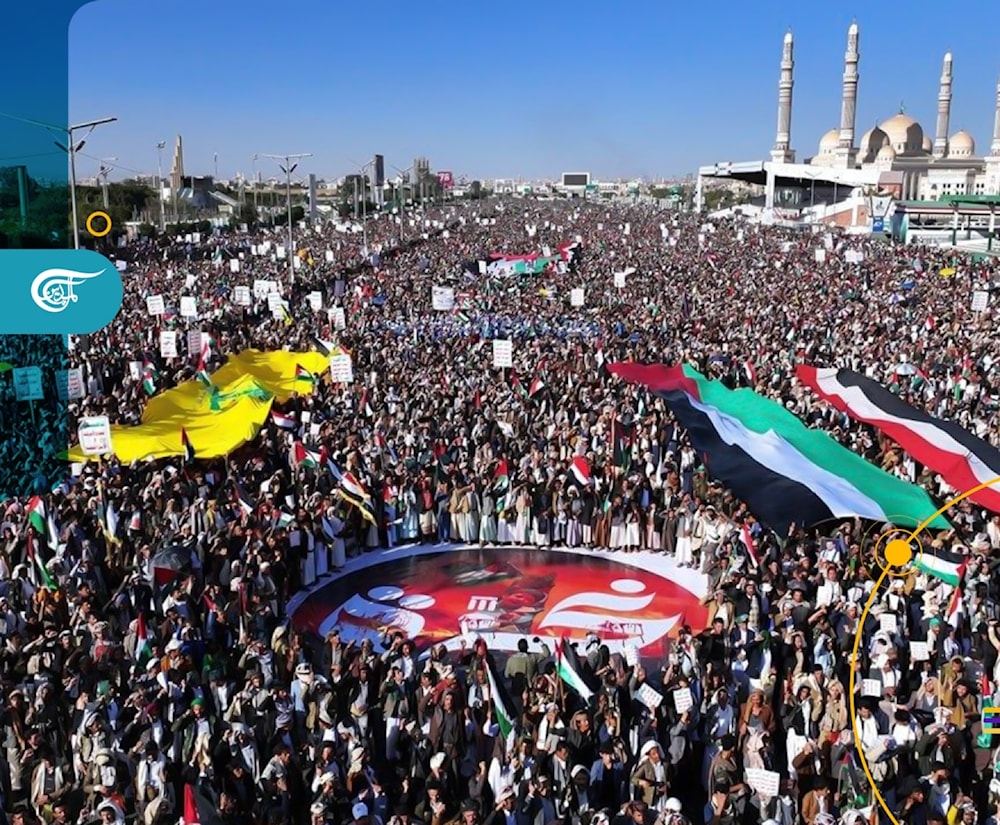Yemenis refuse to migrate despite bombardment in solidarity with Gaza
Yemenis underline that the joint US-British aggression on their soil made them more proud of their country and identity, making them hold on tighter to their sovereign land.
-

Yemenis refuse to migrate despite bombardment in solidarity with Gaza
Fatima, a Yemeni woman, was holding a phone call with her son, Majed al-Mouafa, who works in the Yemeni capital of Sanaa when the US-British coalition launched four consecutive airstrikes on the town of Zabid in al-Hodeidah, western Yemen.
At first, al-Mouaffa was gravely concerned, asking his mother and five siblings to seek asylum in Sanaa until the cessation of hostilities on Yemen. However, they refused to leave their countryside home, insisting that they wanted to continue living their lives normally despite the airstrikes on their country.
The young Yemeni man told Al Mayadeen that all the people of his village and all neighboring villages refused to move despite the Western coalition conducting airstrikes on several areas nearby. He said he was in contact with the residents of his area and underlined that there was a consensus against migration.
"This is our land, and neither the Israelis nor Americans will force us to leave it regardless of the extent of their aggression," he stressed.
Yemenis see their refusal of displacement as an act of resilience and a challenge to the aggressive countries, as well as an act of solidarity with the Palestinian people as they are living under the same circumstances as the people of Gaza.
No displacement
Musfer al-Razihi, a Yemeni man in his fifties, has been living with the sound of the airstrikes on the northern Yemeni governorate of Saada echoing in the distance, but the traumatizing sound of constant bombardment did not in any way affect his daily routine.
"Even if the US aggression lasts for a hundred years, our principles and stances will not change, and we will not waver and fulfill their wishes," al-Razihi said. "The bombardment on Yemen only enhanced the belief of the Yemeni people that they must share the same fate as the Palestinian people who have no safe place to migrate to."
"Yemen in recent years witnessed a particularly heavy internal displacement due to aggression and internal conflict, but the situation this time is completely different," he added. "This is the first time that we have not witnessed any cases of displacement from this area despite the continued shelling."
"The reason behind the [US-British airstrikes], the identity of the aggression, and Yemen's laudable and righteous position on Palestine have made its citizens more proud of themselves and their country. This played a major role in increasing their devotion to their land and their refusal to be displaced," al-Razhi concluded.
Yemen had declared that it was joining the ongoing war being waged by the Israeli occupation on Gaza in solidarity with and support of the Palestinian people, launching dozens of ballistic missiles and drones at several Israeli military sites in occupied Palestine while also attacking and successfully sinking several US, British, and Israeli ships attempting to pass the Red Sea.
A joking matter
Hundreds of social media users shared videos showing Yemeni children and families while they were living their day-to-day lives under bombardment as if nothing was happening as they declared that the US-British coalition was failing through its bombardment to make a dent in their daily routine.
The US-British airstrikes on Yemen became a joking matter in Yemen for their failure to achieve any of their declared goals. One of the most prominent jokes in Yemen is that the airstrikes "are just like those of the UAE-Saudi coalition but in English."

 4 Min Read
4 Min Read








